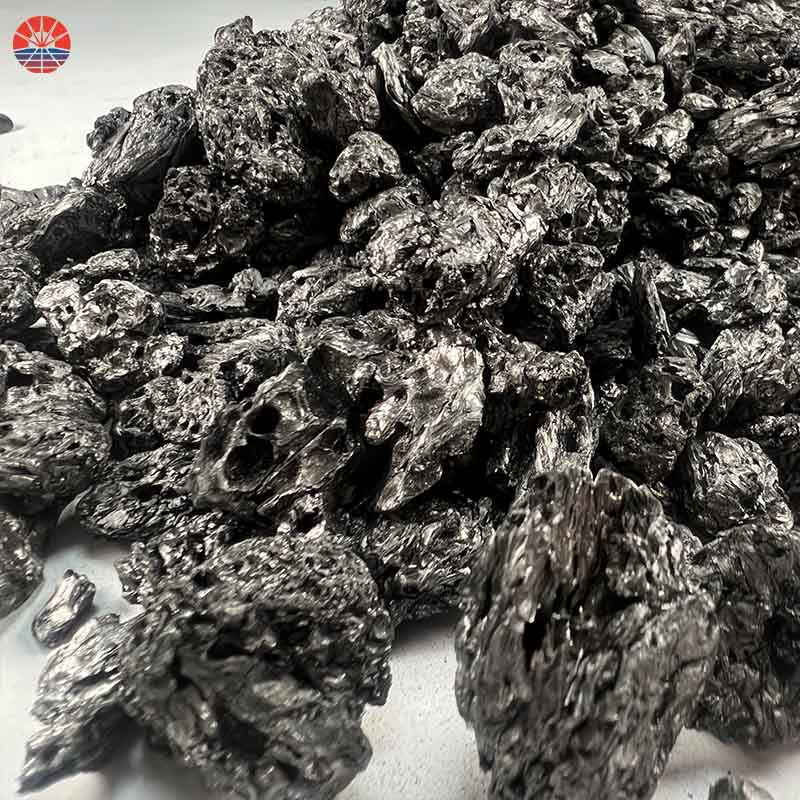Needle Coke Raw Material
A good needle coke is one that possesses specific properties and characteristics that make it suitable for its intended application, particularly in the production of graphite electrodes for electric arc furnaces and other high-temperature applications. Here are some key characteristics of a good needle coke:
High Carbon Content: A good needle coke should have a high carbon content, typically exceeding 97% or even higher. The high carbon purity is crucial for its performance as a graphite electrode, ensuring efficient electrical conductivity and heat transfer.
Low Impurities: It should have low levels of impurities, such as ash and sulfur. Low impurity content helps minimize unwanted chemical reactions and impurities during the electrode's operation, leading to improved performance and durability.
Needle-Like Structure: The coke should exhibit a needle-like or acicular structure, with long, thin, and well-aligned carbon fibers. This unique structure provides the exceptional properties required for graphite electrodes, including high thermal conductivity and mechanical strength.
Low Coefficient of Thermal Expansion: A good needle coke should have a low coefficient of thermal expansion, meaning it expands very little when exposed to high temperatures. This property ensures dimensional stability and reduces the risk of cracking or breaking during high-temperature applications.
High Thermal Conductivity: The needle-like structure allows for efficient heat transfer and high thermal conductivity. This is essential for applications in electric arc furnaces, where the electrode must withstand extreme temperatures and efficiently transfer heat to the furnace charge.
Homogeneous Properties: A good needle coke should have consistent and uniform properties throughout the material. This helps ensure consistent electrode performance and manufacturing quality.
Proper Sizing: The coke particles should be properly sized for the intended electrode manufacturing process. An appropriate particle size distribution contributes to the electrode's mechanical strength and uniformity.
Controlled Manufacturing Process: A good needle coke is produced through a carefully controlled coking process that ensures the desired crystal structure and properties are achieved. Precise control over the manufacturing process is crucial for producing high-quality needle coke.
Due to its specialized properties, needle coke is considered a premium-grade petroleum coke, and it is typically more expensive than other forms of petroleum coke. Its production requires sophisticated technology and expertise to achieve the desired characteristics. As a result, needle coke is produced in limited quantities and is in high demand for specific industrial applications like graphite electrodes for steelmaking and anodes for the aluminum industry.
What Is Needle Coke
Needle coke is a high-quality, specialty form of petroleum coke that is produced through a unique and precise thermal cracking process. It is named "needle" coke because of its needle-like structure, which consists of long, thin, and well-aligned carbon fibers. This unique structure gives needle coke exceptional properties, making it highly sought after for specific industrial applications.
The production of needle coke involves the thermal cracking of specific heavy petroleum feedstocks, such as decant oil or slurry oil, in a coking unit. The coking process is carefully controlled to achieve the desired crystal structure and properties required for various applications. The key characteristics of needle coke include:
High Carbon Content: Needle coke has a very high carbon content, typically exceeding 97% or even higher. This high carbon purity is a critical factor for its applications in high-temperature processes.
Low Ash and Sulfur Content: Needle coke has low levels of impurities like ash and sulfur, which are essential for applications that require high-purity carbon material.
High Thermal Conductivity: The needle-like structure of the carbon fibers allows for efficient heat transfer and high thermal conductivity, making it suitable for applications involving extreme temperatures.
Low Coefficient of Thermal Expansion: Needle coke has a low coefficient of thermal expansion, meaning it expands very little when exposed to high temperatures. This property is vital for applications requiring dimensional stability at high temperatures.
The primary applications of needle coke are in the production of graphite electrodes used in electric arc furnaces (EAFs) for steelmaking and anodes for the aluminum industry. In both cases, the high thermal conductivity, low electrical resistance, and resistance to high temperatures are critical for the efficient operation of these industrial processes.
Due to its specific properties and the complex manufacturing process involved, needle coke is considered a premium-grade petroleum coke and is more expensive than other forms of petroleum coke. It is produced in limited quantities, and its availability can be subject to fluctuations in the market demand and supply.












